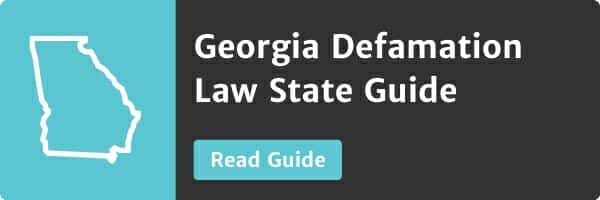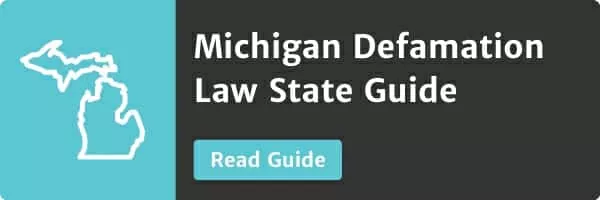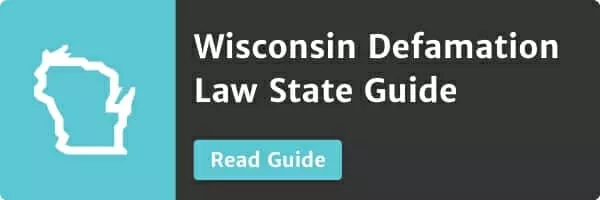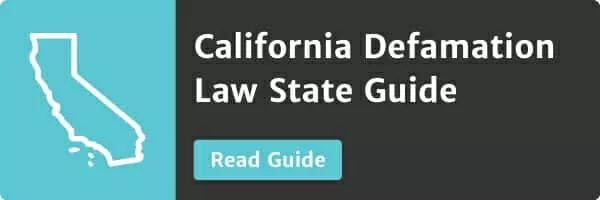
- Originally Published on June 6, 2018
The Minc Law Guide to Illinois Defamation Law
What is Defamation? Illinois’s Definition of Defamation
Often referred to as ‘Defamation of Character,’ the tort of defamation is an all-encompassing legal term governing the act of making, communicating, or publishing a false statement or assertion of fact to a third-party, which ultimately causes harm or damage to another person’s reputation. In Common Law jurisdictions, such as the United States, United Kingdom, and Canada, the tort of defamation is categorized as a civil wrong, which allows injured parties to recover for their losses and damage suffered.
Specifically, the tort of defamation may be broken down into two core types:
- Slander: The spoken communication of a false statement/assertion of fact to a third-party, causing damage or harm to another person’s reputation.
- Libel: The written or published communication of a false statement/assertion of fact to a third-party, causing damage or harm to another person’s reputation.
When accurately describing the nature of the tort committed, the general public often confuses libel and slander, and typically opts to use “slander” to describe any defamatory communication. In reality, you should be looking to the form in which the defamatory communication and false assertion of fact was conveyed before using the term slander.
More importantly, understanding the difference between both libel and slander is imperative for bringing a defamation claim in certain states, as most states have different statutes of limitations for lodging a claim – typically, slander actions are required to be brought earlier than libel actions.
So, what are some other common names for defamation of character?
- Calumny,
- Vilification,
- Character assassination, &
- Disparagement.
Note that the tort of commercial/business disparagement is exclusive to businesses and cannot be filed by merely anyone. Commercial disparagement exists to protect the financial and property rights of businesses, not individuals. If you’d like to read up more on the tort of commercial/business disparagement, check out our comprehensive blog post titled, “What is Business/Commercial Disparagement?” Our blog post addresses the policy behind actions of recovery for businesses, the elements comprising business disparagement, food/veggie libel laws, the most popular defenses to a business disparagement claim, and how to hold disparaging and defaming parties liable.
What do you call a party who communicates and publishes a false assertion of fact to a third-party?
Such parties are commonly referred to as:
- Defamers – the broad term for parties who commit defamation,
- Libelers – the name given to parties who publish a written communication of a defamatory statement,
- Slanders – the name given to parties who verbally (speak) communicate a defamatory statement, &
- Famacide – a less commonly used term which literally means, “a person who destroys another’s reputation.”
Now, let’s turn to Illinois’s specific definition of defamation.
First, it’s worth noting that Illinois courts do NOT distinguish between libel and slander.
Illinois defines defamation as a statement which harms a person’s reputation because it lowers that person in the eyes of others or deters others from associating with them.
To state a cause of action for defamation in Illinois, a plaintiff must present facts showing the defendant made a false statement about the plaintiff, the defendant made an unprivileged publication of that statement to a third party, and such publication caused damages.
If you’re curious about other states and their defamation laws and definitions, check out the following comprehensive blog posts on state defamation law:
- Ohio Defamation Law,
- Utah Defamation Law,
- New York Defamation Law,
- Texas Defamation Law, &
- Florida Defamation Law.
Broken down even further, in order for a plaintiff to succeed in their defamation (libel or slander) claim in Illinois, they must prove the following three (3) elements:
Illinois Defamation Elements
Illinois defamation plaintiffs must prove and present facts showing the defendant:
- Made a false statement about the plaintiff;
- Made an unprivileged publication of that statement to a third-party; &
- The publication caused damages.
All three fundamental elements of Illinois defamation claims will be addressed in this all-encompassing blog post and outline.
Online Defamation Tip: If you are the victim of online defamation and malicious attacks, there’s several steps you can take to increase your claim’s likelihood of success. (1) Make sure to screenshot any defamatory material you find online, (2) Have a friend or family member screenshot it, and (3) Preserve any information you can.
If you’re a resident of Illinois or any other U.S. state and have been the victim of online defamation or other malicious attacks and allegations, contact the internet defamation removal attorneys of Minc Law now!
The Minc Law team of defamation removal lawyers have secured hundreds of takedowns and removals, all from cheater websites, revenge porn websites, consumer advocacy websites, scam reporting websites and more. At Minc Law, we know who to work with and how to work with them, and know what it takes to secure a swift and permanent removal – all for a flat, reasonable fee.
Reach out today to schedule a free, no-obligation initial consultation with an intake specialist by calling us at (216) 373-7706, or by scheduling a meeting by filling out our online contact form.
At Minc Law, we are here to fight for your reputation.
Now, let’s turn to Illinois’s pleading standard for defamation and tackle exactly what pleadings are and why they exist.
Illinois’s Defamation Pleading Standard
First, before we get into Illinois’s defamation pleading standard, it’s important for us to define exactly what pleadings are. If you’ve ever watched a legal tv drama, you’ve likely heard one of the following phrases or terms thrown around.
Pleadings are specific formal documents which are filed with a court, stating a party’s fundamental positions and claims against one another. Pleadings are initiated by the plaintiff (after all, they are the one with the initial claim). Let’s take a look at one of the following documents which are commonly used in pre-trial pleadings:
- Complaint: a formal document outlining the plaintiff’s claims and positions, version of the facts of the case, and damages sought.
- Answer: the defendant’s response to a plaintiff’s complaint – where they respond to the plaintiff’s accusations by either refuting them or raising specific defenses which would excuse their actions.
- Reply: an additional response by either the plaintiff or defendant to new or additional claims introduced by the other.
- Counterclaim: a claim made to offset a different claim, used by the defendant in a legal action.
Note that pleadings vary by state and area of law, therefore it’s extremely important you familiarize yourself with your state’s specific pleading requirements and formalities. Or, we highly recommend you consult an experienced defamation removal attorney to better understand how to effectively bring a defamation claim.
For example, certain states may impose shorter and stricter filing deadlines for specific claims – for instance, libel claims must typically be brought before slander claims – while other states may have more relaxed deadlines and timeframes. Additionally, a certain area of law could require a plaintiff to plead and prove their case in a very descriptive and direct way, to weed out vague and borderline cases which could clog the judicial system and fail to properly put a defendant on notice of the nature of the claim against them.
Unlike the notice pleading standard used in federal court – which is merely to emphasize the general issues of the case without detailed supporting facts – Illinois requires that a civil complaint must plead the ultimate facts of the case which give rise to the cause of action.
Illinois notes:
“The allegations are sufficiently specific if they factually set forth the elements necessary to state a cause of action. It is obvious that elements of a cause of action for libel are not factually set forth unless the defamatory words of the defendant are included.”
Additionally, Illinois libel plaintiffs are required to show with “convincing clarity” that the defendant entertained serious doubts as to the truth of the publication to prove “actual malice.”. A defendant will be found to have acted with actual malice where they knew the statement at hand was false, or published and communicated it with reckless disregard of its veracity. To read up further on defamation of character claims and actual malice, check out our blog post titled, “What is Defamation of Character? How to Prove Online Defamation”.
We will also address the notion of actual malice – along with ordinary negligence – when we tackle the legal requirements imposed on both public officials, public figures, and private persons in Section 3.
So, what happens when a plaintiff is bringing a claim against multiple defendants for libel or slander?
In an action with multiple claims against multiple defendants, a defamation claim must clearly pinpoint which specific defendants are liable for defamatory statements.
Now that we’ve covered Illinois’s pleading requirements (which are stricter than that at the federal level), let’s take a look at several statements which Illinois law and the Common Law have declared to be so inherently defamatory that plaintiffs need not prove actual damage or injury. This is commonly referred to as ‘Defamation Per Se’.
What is Defamation Per Se? What Types of Statements Does Illinois Consider ‘Defamatory Per Se’?
Just remember, depending on the form in which the alleged defamatory statement or communication is conveyed, it may take different names. For example, defamation per se may also be referred to as ‘slander per se,’ for spoken statements addressing one of the below categories of statements, and ‘libel per se,’ for written statements addressing the same.
To constitute libel per se in Illinois, a statement must fit within one of the recognized four (4) categories that will sustain a per se action.
Under the four traditional libel and slander per se categories, a statement must be false and impute:
- “The commission of a crime,
- The infection with a loathsome disease,
- The unfitness or want of integrity in performing duties of an office or employment, &
- [Use] words which adversely reflect on a particular party’s abilities in his business, trade or profession.”
The legal doctrine of defamation per se is typically associated with presumed damages, as since there is no need for a plaintiff to prove damages, then they must be presumed. We will address presumed damages and other defamation damages in Section 5.
And, “If the actual words spoken do not by themselves denote” the defamatory meaning, “the words are not actionable as defamation per se.” Simply put, should the alleged words in question fail to indicate or reference one of the above categories, then they will not be considered defamation per se. However, they may be classified as defamation per se’s very opposite cousin; ‘Defamation Per Quod’.
Let’s take a look at an example of defamation per se in Illinois:
- Industrial spy: Statements accusing an employee of being “an industrial spy, lying, stealing, and attempting to deceive” a company’s management were considered defamatory per se.
Defamation Per Quod
Completely opposite to the legal principle of defamation per se, defamation per quod requires plaintiffs bringing a defamation claim to prove the defamatory statement(s) at hand was actually defamatory through the use of supporting and extrinsic evidence.
Unlike defamation per se, defamation per quod actions do not presume damages, and are typically associated with special damages – due to the specified pleading and proving requirements.
Illinois defines libel per quod as “a per quod claim applies when a statement is innocent on its face but extrinsic facts make the statement defamatory or where a statement is defamatory on its face but does not fall into one of the per se categories.”
More specifically, libel per quod is considered to be a false statement, not falling within one of the four (4) per se categories, and is only actionable when:
- Extrinsic facts are shown which render the otherwise innocent language defamatory, &
- Special damages are proven.
If you can’t back your defamation claim up with supporting evidence, you better hope the allegedly defamatory statement(s) in question fall into one of the above per se categories, otherwise, you likely won’t succeed in your defamation claim.
Defamation by Innuendo/Implication
Illinois courts have opined, “It is well-established that statements made in the form of insinuation, allusion, irony or question may be considered as defamatory as positive and direct assertions of fact.”
Typically, courts will look to see the context in which the statement was made and how the statement would be construed by an average and reasonable person. Sometimes, a defendant doesn’t need to come right out and make an explicit defamatory statement, but may still imply such, and this will carry the same weight as a positive and direct false assertion of fact.
Below is an example of a time where a fiction article was construed to consider the implication behind it.
- Harmful fiction article: An allegation that a “fiction” article could be construed as calling the plaintiff a “slut” was sufficient to state a claim for defamation.
Innocent Construction
Innocent construction refers to the legal principle that an allegedly libelous statement will be afforded innocuous or harmless interpretation if that statement is either ambiguous or harmless.
Specifically, illinois defines innocent construction as, “A written or oral statement is to be considered in context, with the words and the implications therefrom give their natural and obvious meaning; if, as so construed, the statement may be reasonably be innocently interpreted or reasonably as referring to someone other than the plaintiff, it cannot be actionable per se.”
Thus, “even where a statement falls into one of the recognized per se categories, it will not be actionable as defamatory if it is reasonably susceptible to an innocent construction.”
Oftentimes, such rule does not require courts to “strain” to find an unnatural innocent meaning for a statement when a defamatory meaning is likely more reasonable and vice versa.
Also, keep in mind that the innocent construction rule bars any claims of libel where the defamatory statements may reasonably be construed to refer to persons other than the plaintiff. Look back to the beginning of Section 1, where we tackled the three core elements comprising Illinois defamation claims. The first element requires the statement be made about the plaintiff, and must of “of and concerning” the plaintiff.
Below is an example of an instance where innocent construction was not applicable.
- An anonymous online comment to a newspaper article which conveyed that the commenter was a pedophile was not subject to innocent construction.
Of and Concerning an Illinois Defamation Plaintiff
If an Illinois defamation defendant’s statements did not mention the plaintiff’s name, the plaintiff must allege and prove that third-parties would reasonably have understood that the libel referred to the plaintiff.
Additionally, a plaintiff who is not named in the allegedly defamatory statement(s) must also plead special damages.
Online Defamation Removal Tip: If you are looking for a free and easy way to suppress negative and defamatory Internet search results about you, we at Minc Law suggest you: (1) Start making positive social media profiles public, (2) Interlink between said profiles, (3) Start commenting openly on high-volume and positive websites, and (4) Establish a blog and frequently update it.
Important Illinois Defamation Lawsuit Requirements & Formalities
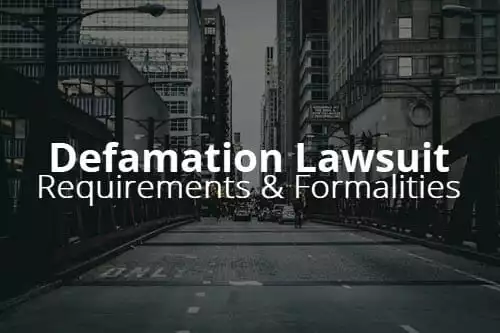
When bringing a defamation lawsuit in Illinois and other states, there are certain requirements and formalities a defamation plaintiff must abide me. In this section we’re going to tackle the jurisdictional reach of courts, whether you can bring a suit against an out-of-state defendant, in which venue, Illinois’s defamation statute of limitations, and more.
Do Illinois Courts have Jurisdiction Over Out-of-State Defamation Defendants?
Simply put, yes. Persons affected by defamation by an out-of-state publisher may commence an action against them in any city in which the publication was circulated.
However, publication in Illinois by a third-party of an alleged libel by a non-media defendant does not by itself subject the out-of-state defendant to Illinois jurisdiction.
Which Laws Should Be Applied to a Defamation Action Against an Out-of-State Defendant?
Now that you know Illinois residents affected by defamation by an out-of-state party may bring a defamation action against them, it’s important to understand which jurisdiction’s laws will be applied in the suit.
Illinois generally follows the “most significant relationship” approach in defamation cases, which means “that Illinois privilege does not follow communications broadcast in other states.”
Under the most significant relationship approach, Illinois courts will consider:
- The place of injury:
- The place where the injury-causing conduct occurred,
- The domicile of the parties, &
- The place where the relationship of the parties is centered.
Quality Carriers v. MJK Distrib., Inc., 2002 U.S. Dist. LEXIS 5700, 2002 WL 506997, at *9 (S.D. Ill. Apr. 3, 2002).
Keep in mind that in multi-state defamation cases, Illinois cases have held the applicable law will be that of the plaintiff’s domicile.
So, what can we take away from all of this?
First, you may bring an action against an out-of-state defamation defendant for the publishing of defamatory statements. However, it isn’t always as simple as that if the party who published the defamatory material is a non-media defendant, and such will likely not form the basis for Illinois jurisdiction. And, finally, when determining which state’s laws to apply in a defamation suit against an out-of-state defendant, Illinois courts have held the applicable law to the suit will be that of the plaintiff’s domicile.
When determining which parties are liable for defamation and other formalities and requirements surrounding an out-of-state defamation case, we strongly recommend you consult an experienced internet defamation attorney.
Reach out today and call the defamation removal lawyers of Minc Law at (216) 373-7706, or schedule a meeting online via our contact form.
Libel Law Tip: In the wild wild west of defamation law, the United States is typically considered a pro-defendant defamation jurisdiction to its longstanding history and enforcement of the Constitution’s First Amendment of free speech, while European countries and other Commonwealth countries (such as Canada and the United Kingdom) are generally considered to be more plaintiff-friendly.
Now, let’s take a look at Illinois’s defamation statute of limitations time frame and how it stacks up against other U.S. states.
Illinois’s Defamation Statute of Limitations
First, for those unfamiliar with what exactly a statute of limitations is, it’s simply a limiting timeframe put on the commencement of a legal action. A statute of limitations period prohibits plaintiffs from bringing a claim after a certain amount of time has elapsed, and exists for several key reasons:
- Reasonable diligence: SOLs exist to encourage plaintiffs to bring their legal actions within a timely manner and with reasonable diligence,
- Prevent loss of evidence: To prevent the chance of a defendant accidentally destroying or losing evidence,
- Eliminate cruelty: SOLs eliminate more “cruelty than justice,” by making sure both parties are adequately and duly prepared.
Should a plaintiff fail to bring their claim within the time period set forth in a statute of limitations, then they will likely be barred from filing their claim – or may be allowed to proceed, but penalized.
In Illinois, actions for libel and slander must be brought within one (1) year from the date the defamatory statement(s) were first published.
Affecting the accrual date of when a plaintiff is required to bring their defamation claim is the legal principle called the ‘single publication rule’, a widely adopted rule across the U.S.

Single Publication Rule
Under the single publication rule, plaintiffs are typically limited to bringing only one (1) claim for each mass publication or communication of a defamatory statement(s) by a publisher. Plaintiffs are not able to bring an individual claim for every subsequent and unique publishing or copy thereafter.
The purpose?
To prevent our judicial system from being overrun by claims which can ultimately be settled in a single case. Our legal system needs to function as a well-oiled machine, and having unnecessary and multiple cases over the same defamatory statements or publications leads to a slow erosion of its efficacy.
Illinois has adopted the Uniform Single Publication Act which states, “No person shall have more than one cause of action for damages for libel or slander or invasion of privacy or any other tort founded upon any single publication or exhibition or utterance…” It continues… “…a single publication or exhibition or utterance as described in Section 1 shall bar any other action for damages by the same plaintiff against the same defendant founded upon the same publication or exhibition or utterance.”
Does the Single Publication Rule Affect Internet Defamation Cases in Florida?
The single publication rule will likely apply to Internet publications.
The Seventh Circuit Court of Appeals concluded that, if presented with the opportunity, the Illinois Supreme Court would hold that the single-publication rule applies to the Internet.
Defamation Law Fact: Surprisingly, for a country which has emphasized the U.S. Constitution’s right of free speech so heavily, the U.S. Supreme Court neglected to apply the First Amendment to media defendants in cases involving libel – ultimately leaving libel laws mixed and conflicting across states.
Below is a chart comparing how Illinois’s one (1) year statute of limitations for libel and slander claims stacks up against other U.S. states.
| Utah | One (1) year |
| Ohio | One (1) year |
| New York | Two (2) years |
| Florida | Two (2) years |
| New Hampshire | Three (3) years |
| Massachusetts | Three (3) years |
Most states typically fall in the one to two year range for bringing defamation actions, however there are several states who have even more nuanced laws. For example, Arkansas and Rhode Island both impose a one-year statute of limitations to slander actions, while applying a three-year statute of limitations to libel suits.
For a comprehensive state-by-state guide for slander and libel statutes of limitations, check out our Complete Guide to Online Defamation Law.
If you’re an Illinois resident or of any other U.S. state and have been subject to malicious and defamatory online attacks and accusations, the internet defamation lawyers of Minc Law want to fight for you. At Minc Law, we boast a nearly 100% online defamation takedown rate, and all for a flat, reasonable fee.
Our defamation removal attorneys have litigated in over 19 states and 3 countries, and have secured hundreds of online removals and takedowns. We know who to work with and how to work with them in order to secure a permanent and quick online defamation removal.
Get started today by calling the defamation attorneys of Minc Law for a free, initial no-obligation consultation with an intake specialist at (216) 373-7706, or by scheduling a meeting by filling out our online contact form.
It’s never too late to take back your reputation and identity.
Public v. Private Persons: Which One Am I?
In furtherance of public debate and open discussion about contentious persons in the public eye and hot topic issues, defamation law treats claims made by private and public persons in a different way. And, depending on whether a party is considered a private or public plaintiff under defamation law, they will enjoy greater or lesser protections and burdens of proof when bringing their defamation of character claim.
As it affects your personal legal rights, it’s important to acquaint yourself with the various types of defamation plaintiffs that your state recognizes. You just might be surprised to find out which type of plaintiff your state considers you to be.
So, how did it all start?
First ruled on in 1964, New York Times Co. v. Sullivan laid forth the revolutionary framework required for private and public plaintiffs bringing a defamation claim. Ultimately, the Supreme Court found that a distinction between both private and public plaintiffs was essential for the promotion of “uninhibited debate of public issues” and the First Amendment. The court held there were two types of defamation plaintiffs, and establish two differing burdens of proof that each plaintiff needed to meet in order to succeed in their defamation claim.
- Private plaintiffs: Unless you’ve enjoyed a significant spot in the limelight in the last few years, you likely fall under the category of a private plaintiff. Private plaintiffs are persons who are your ordinary, everyday citizens who have not availed themselves to public scrutiny or thrust themselves into the discussion of highly public and contentious issues. As such, private persons enjoy a higher degree of protection and privacy, and are only required to prove a defendant acted with ordinary negligence when communicating or publishing an allegedly defamatory statement. Ordinary negligence can be defined as the ordinary care one would expect a reasonably prudent person to exercise in the same situation or similar circumstances.
- Public plaintiffs: Think of your Justin Biebers and Obamas of the world. Think celebrities, politicians, and other highly public and notable figures in your community and in the media. Such persons are considered public plaintiffs, as they have availed themselves to a higher degree of scrutiny and criticism by the general public. Should there be censorship of discussion about such persons, free speech and open discussion would ultimately be halted, leading to a less-informed and active society – therefore, defamation law sanctions a higher degree of protection for individuals who discuss hot-topic issues about certain public figures. In order for a public plaintiff to succeed in their defamation of character claim, they must prove that a defendant acted with actual malice or reckless disregard when communicating or publishing the false statement(s) in question.
You can read up further on actual malice and ordinary negligence by checking out our blog post explaining defamatory statements.
The state of Illinois defines a public figure or official as anyone carrying out a function of government or participating in acts that are related to matters in which the government has a substantial interest.
Let’s take a look at several examples of what the Illinois courts have determined to be public and non-public figures.
Public Figures
- A local NAACP president was determined to be a public figure under Illinois law.
- Police officers and the deputy chief of detectives were all considered to be public figures.
- A public school principal is classified as a public figure in Illinois.
Non-Public Figures
- An Illinois court determined a local minister was not a public figure.
- A civil jailer was found to be a non-public figure in Illinois.
- A publisher of a trade magazine was classified as a non-public figure.
Defamation Fact: In 1997, a record libel verdict was rendered against Dow ones in favor of MMAR group, awarding MMAR Group Inc., over $220 million dollars. However, ultimately, the verdict was dismissed two years later after it was revealed MMAR failed to disclose certain evidence.
Now that we’ve tackled the core differences between private and public plaintiffs and looked at some case examples, let’s take a further look at what the U.S. Supreme Court and Illinois Supreme Court have determined to be issues of public and private concern. Just as public and private plaintiffs enjoy varying degrees of protection and differing burdens of proof, issues of public and private concern both enjoy different protections.
Issues of Private & Public Concern
As mentioned above, statements and communications regarding issues of public and private concern are afforded different forms of protection under U.S. defamation law. After all, the government has an interest in promoting an educated and informed society and without such protections for persons say, commenting on a matter of public interest, ultimately, our democracy will become less effective and less-informed.
In a 1971 landmark defamation case, the United States Supreme Court ruled that private plaintiffs must prove media defendants published or communicated a statement with actual malice when publishing on “an event of public or general concern” in order to recover damages.
The Illinois Supreme Court has adopted what is commonly referred to as the “negligence” standard of fault for cases involving a private figure plaintiff. However, when it comes to matters of vital public concern, the Illinois Supreme Court has held that a plaintiff, although a private one, must prove the defendant acted with actual malice.
There is one important exception that has contradicted the requirement set forth in Farnsworth that a private plaintiff prove a defendant acted with actual malice in matters of vital public concern, and that’s the case of Rosner v. Field Enters., Inc. The court in Rosner held that a private figure plaintiff was not required to prove actual malice in a case involving a matter of public interest or concern, and proof of negligence was held to be sufficient where a private plaintiff was involved and no common law privilege applied.
Libel Removal Tip: As addressed below, criminal libel exists in several states, but is rarely prosecuted, as it has often ruled to be constitutionally vague. Keep in mind that a common defense to libel that may result in dismissal before trial is the defense of “fair comment and criticism,” or comments on matters of public interest that are not made with ill-will or spite.
Common Defenses to Defamation in Illinois
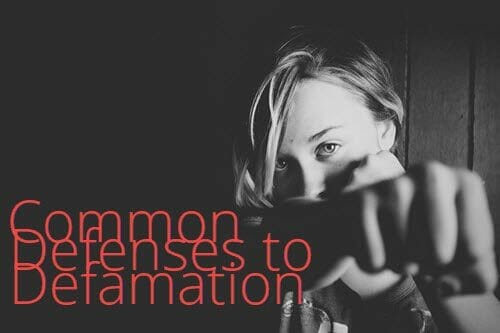
In Illinois and the rest of the United States, even if a party publishes or communicates a defamatory statement, they may still be excused and avoid liability in certain circumstances.
Below is a list of some of the most popular defenses to the tort of defamation in Illinois (and United States).
- Opinion,
- Truth/Falsity,
- Privilege (Absolute, Qualified, Fair Report, Statutory, Neutral Report)
- Libel-Proof Plaintiff Doctrine, &
- Wire Service Defense/Privilege.
First, let’s take a look at possibly the most popular defense to the tort of defamation and one which is recognized by nearly every U.S. state – the defense of opinion.
Opinion
Under Illinois defamation law, the rule of innocent construction should be applied in determining whether a statement is protected expression of opinion.
Remember, the rule of innocent construction ascribes an either harmless or innocuous interpretation if the statement is harmless or ambiguous. Courts should not look to try and read too much into a statement to find libel when there is no libel there.
A statement will not be protected in Illinois if it implies the existence of undisclosed facts which are both false and defamatory.
Mixed expressions of fact and opinion will be actionable if the facts are subject to verification as true or false. Just because a party combines statements of opinion with false assertions of fact, it does not mean that they escape liability for defamation.
4 Examples of Illinois Opinion Case Law
- Bribery: A statement posted on the Internet that the plaintiffs bribed officials in order to obtain approval for their zoning requests was more than a mere statement of opinion and thus was considered actionable.
- Law firm loss: A law firm’s partner’s statement that loss incurred was due to an associate’s “fault” was held to be opinion – although the partner’s statement that the associate knowingly sat on a statute of limitations defense was held to be a statement of fact.
- Sports commentator: A general statement that a sports commentator was a liar, without reference to specific facts, was considered to be a statement of opinion.
- Country club: Statements made in an open letter to members of a country club expressing concern about the “direction” the club was taking were determined to be opinion and not libelous by the plaintiff’s club manager.
Truth/Falsity
As we’ve touched on throughout this blog post, defamation of character suits are fundamentally centered on a false assertion of fact, therefore, it shouldn’t be any surprise that truth or falsity is an absolute and complete defense to the tort of defamation. Although the truth may hurt, that’s no excuse for censoring its publication.
Article 1 of the Illinois Constitution provides that truth is a defense to all actions for libel, “when published with good motives and for justifiable ends.”
However, the “good motives” limitation in Illinois’s truth defense is considered unconstitutional in regard to actions in which the New York Times actual malice standard applies. The Illinois Supreme Court has suggested that the “good motives” limitation in the truth defense is constitutional in regard to other defamation actions.
Note that when it comes to the burden of proving falsity, Illinois courts have consistently placed the burden of proving falsity on libel plaintiffs, not defendants.
Privilege
Privilege is a relatively straight forward legal concept where certain certain persons in certain situations are able to make an allegedly defamatory statement without legal repercussion. More specifically, privilege is a person’s legal right, entitlement, or enjoyment to publish or communicate a statement – regardless of whether it’s defamatory or not.
Without the defense of privilege, decision making institutions and mechanisms as we know it would slow down and ultimately come to a screeching halt, as some of the most important persons in our administrative, judicial, political, legislative, and official decision making processes would be censored from speaking their mind in order to further policy and regulation.
Democracy exists to promote open discussion, and privilege is one of the core driving forces behind open discussion of contentious issues in the United States.
Illinois recognizes five (5) specific privileges defendants may rely on when being charged with defamation.
- Absolute,
- Qualified,
- Fair Report,
- Neutral Reportage, &
- Statutory.
Absolute
Absolute privilege is the ultimate form of privilege afforded to speakers of defamatory statements, as it is the unequivocal and unqualified right to make such statement – even if the contents are defamatory. Since absolute privilege is the overarching form of privilege, it even applies to statements which are communicated or published with actual malice and reckless disregard.
Absolute privilege is commonly found at the heart of our judicial, administrative, and other official proceedings, as that’s where some of the most contentious and important political, economic, legal, and social debates exist.
Illinois recognizes certain types of statements are absolutely privileged in order to promote free speech, and so that persons are not deterred by the threat of civil liability for making those statements. Communications in Illinois are absolutely privileged “when their propagation is so much in the public interest that the publisher should be able to speak fully and fearlessly.”
Once again, when absolute privileges attaches to a speaker or statement, no action for defamation lies, even where malice is alleged.
Illinois specifically singles out judicial proceedings as circumstances where absolute privilege will attach.
- Judicial proceedings: Absolute privilege is extended to legislative, judicial, and quasi-judicial proceedings and official acts of state officials.
Qualified Privilege
Qualified privilege is absolute privilege’s cousin, as it attaches in fewer circumstances, and may be defeated by a defendant who speaks or communicates a statement with actual malice. Qualified privilege is typically referred to as ‘Common Interest Privilege,’ and is a party’s right, entitlement, or joy to communicate or publish a statement in certain situations.
Qualified privilege usually attaches in situations involving parties in positions of authority and trust, who have a social, legal, or moral duty to communicate certain statements to a specific audience – additionally, that same audience must have a reciprocal interest in hearing such statements.
Illinois follows the Second Restatement of Torts in determining whether a qualified privilege should be recognized in a given situation. The Second Restatement outlines three classes of qualified privileges:
- Situations in which some interest of the person who publishes the defamatory matter is involved,
- Situations in which some interest of the person to whom the matter is published or of some other third person is involved, &
- Situations in which a recognized interest of the public is concerned.
Simply put, if the audience has a reciprocal interest in hearing such statements and the statements are of public concern, then qualified privilege will attach. Just remember, statements made with actual malice will not enjoy qualified privilege.
Fair Report Privilege
Fair report privilege is crucial for a thriving news media, including journalists, newspapers, and other mass publications. Fair report privilege protects persons and organizations who rely on official, judicial, legislative, and other administrative reports and publish information contained within them.
After all, if you can’t trust a government report on the effects of smoking, than what can you trust. Fair report privilege promotes trust within our decision making bodies and helps mold a public and consumer who takes such reports as factual and accurate.
Think about it, what type of society would we live in where we punished individuals who relied on a government report.
In Illinois, a report of a governmental proceeding will be privileged unless the report significantly alters the defamatory meaning of the statements made by government officials.
“Under the privilege, the news media may reprint defamatory information reported by another in the context of public records or proceedings … In addition, it has also been said that the privilege protects news accounts based on the written and verbal statements of governmental agencies and officials made in their official capacities.”
However, fair report privilege may not apply if the defamatory statement itself does not appear in the public record.
Neutral Reportage
Also referred to as “neutral report privilege,” neutral reportage is a common law privilege is a limited exception to the legal rule that anyone who republishes or repeats a defamatory statement is equally as guilty as the original publisher.
Neutral report protects media and other news organizations who republish unproven accusations and allegations about public persons and figures. It’s common in political debates or reports for public persons to openly criticize and question one another, so republishing their accusations and accompanying statements should not subject one to legal repercussion.
It appears there’s a split of authority amongst Illinois appellate courts regarding the neutral report privilege. For example, the Fourth District Appellate Court recognized the privilege and gave it an expansive reading in Krauss v. Champaign News Gazette, 59 Ill. App. 3d 745, 375 N.E.2d 1362 (1978), however, the Fifth District Appellate Court discussed it, but refused to apply the privilege in Fogus v. Capital Cities Media, 111 Ill. App.3d 1060, 444 N.E. 2d 1100 (1982).
Statutory Privilege
Some states codify certain privileges in their books, so there’s no confusion as to its protections or which situations it applies to.
Below are several situations where Illinois has codified privilege.
- Hospital peer review & quality control: Section 10.2 of the Hospital Licensing Act, 210 ILCS 85/10.2, creates immunity from civil liability for hospitals, hospital administrators, and staff for the conduct of hospital peer review committees and other hospital committees whose purpose is quality control or the improvement of patient care. See also Section 5 of the Medical Practice Act, 225 ILCS 60/5.
- Insurance cancellation policies: In order to facilitate candid communication between insurers and the insured regarding cancellation of policies by the insurer, Illinois law recognizes an absolute privilege for statements made in “any written notice of cancellation or nonrenewal.”
- Employee tort liability: Under Section 2-107 of the Illinois Tort Immunity Act, 745 ILCS 10/2-107, “a local public entity is not liable for injury caused by any action of its employees that is libelous or slanderous or for the provision of information either orally, in writing, by computer, or any other electronic transmission, or in a book or other form of library material.”
- Communications Decency Act & Internet providers: As we know, under Section 230 of the Communications Decency Act (47 U.S.C. § 230 (2000)), Internet providers are immune from state causes of action that would hold them liable as the publisher or speaker of information they disseminate which was created by a third-party. In Barrett v. Fonorow, 343 Ill. App. 3d 1184, 799 N.E. 2d 916 (2003), an Illinois appeals court declined to hold the president and owner of a website liable for posting articles written by a third party that they allegedly knew were defamatory.
If you’d like to read more about Section 230 of the Communications Decency Act and the near-blanket immunity it provides for Internet providers, check out our comprehensive article, “What is Section 230 of the Communications Decency Act?”, or simply watch our video on the topic below.
Video: Why Section 230 of the CDA Should Matter to You

Finally, if you are unsure about who you can hold liable for online defamation and malicious, false attacks against your character and reputation, we strongly recommend you consult an experienced internet defamation removal attorney.
At Minc Law, we’ve secured hundreds of removals, and boast a nearly 100% removal rate – all for a flat, reasonable fee.
Reach out to Cleveland-based Minc Law team of defamation lawyers today by calling (216) 373-7706, or by scheduling a meeting by filling out our online contact form.
Illinois Privilege Comparison Table
| Type | Absolute | Qualified | Fair Report | Neutral Reportage | Statutory |
|---|---|---|---|---|---|
| Definition | An unqualified and unequivocal right, entitlement, or joy to make a certain statement - even if it’s defamatory on its face. | A qualified right, entitlement, or joy to make a certain statement, usually granted to persons in positions of authority or trust. | A legal right granted to persons and organizations who publish information that they relied upon from an official, judicial, legislative, or administrative proceeding or report. | A legal right granted to media organizations, such as newspapers and magazines, who republish defamatory statements made by public officials and persons. | Legal rights codified into state laws which prescribe for certain situations (by law) where a person may make a statement without fear of legal repercussion. |
| Can it be defeated? | No - even if the statement is published with actual malice. | Yes - if the statement is published with actual malice. | Yes - if the statement(s) is published with actual malice or materially altered in a significant way. | Yes - if the statement(s) is published with actual malice. | N/A. |
| Examples | Legislative, judicial, and quasi-judicial proceedings and official acts of state officials. | In situations (1) in which some interest of the person who publishes the defamatory matters is involved, (2) in which some interest of the person to whom the matter is published or of some other third-person is involved, and (3) in which a recognized interest of the public is concerned. | Governmental proceeding reports, public records, and statements made by officials in their official capacities. | Neutral reports which publish statements made by one public figure about another. | Hospital peer review committees who act for the purposes of quality control or patient care improvement, communications between insurers and the insured in regards to cancellation policies, libelous or slanderous acts committed by employees, and Internet service providers (ISPs). |
Defamation Law Fact: Some lesser known defenses to defamation claims include; statements made in good faith and reasonable belief that they were true, consent (you can’t later get angry for a publication you consented to), innocent dissemination, and no third-party communication.
Libel-Proof Plaintiff Doctrine
Although it doesn’t appear that the libel-proof plaintiff doctrine is recognized in Illinois, it’s still important to take a look at this nuanced defense.
Think of a person whose reputation is so diminished and widely looked down upon, that even a libelous or slanderous publication or statement about them has literally no affect on their reputation. Some parties are just so reviled in their community, that even a defamatory statement fails to harm their reputation.
Some common examples in other states include drug dealers and well-known criminals with multiple convictions known by a small community.
Wire Service Defense/Privilege
A rarely used defense in the realm of defamation law, the wire service defense immunizes news media and other organizations who publish communications from “reputable news services” which was received via a reputable wire service.
The wire service defense has been discussed in such Illinois cases as Ludlow v. Sun-Times Media, LLC, 2015 WL 1774399, but not explicitly accepted or applied.
Illinois Defamation Damages
A core element to a defamation claim is the plaintiff’s proving they suffered or incurred damages as a result of the allegedly defamatory statement(s). Damages are usually quantified in a monetary sum, and meant to act as reimbursement for the harm and injury suffered.
Defamation damages can be divided into four (4) core types:
- Special Damages,
- Presumed Damages,
- Actual Damages, &
- Punitive Damages.
Special Damages
Commonly associated with the legal principle of defamation per quod, special damages are sought for special or unique injury suffered.
In cases involving libel per quod in Illinois, special damages must be alleged and proved with particularity and general allegations as to the damage to the plaintiff’s reputation, business, and health, will not be adequate.
An Illinois plaintiff pleading special damages must show:
- Which statements caused what damage,
- How such damage was caused, &
- The exact amount of alleged damages.
Presumed Damages
Presumed damages are typically associated with the legal principle of defamation per se, and are as their name implies – presumed. This means that a plaintiff need not provide supporting evidence to prove they suffered a special type of harm or injury. Remember, some statements are considered so detrimental and injurious to one’s reputation that the plaintiff need not prove actual damage.
In Illinois, if the plaintiff proves libel or slander per se, damages will be presumed and no allegations or proof of damages will be necessary.
However, this is not an irrebuttable presumption and the defendant may present evidence of the plaintiff’s reputation.
Actual Damages
Also referred to as “compensatory damages,” actual damages are issued when a plaintiff can prove tangible and real damage suffered.
Actual damages in Illinois are considered those that the law presumes from the publication of a libel per se. Factor to be considered include:
- The type of medium in which the statement was conveyed,
- The number of viewers, &
- The reputation or statute of a reporter.
Punitive Damages
Punitive damages are damages enforced against a defendant as a form of punishment, typically for especially malicious or wanton behavior.
Punitive damages may also be referred to as “exemplary damages,” and are typically awarded in Illinois “when the defendant’s tortious conduct evinces a high degree of moral culpability, that is, when the tort is ‘committed with fraud, actual malice, deliberate violence or oppression, or when the defendant acts willfully or with such gross negligence as to indicate a wanton disregard of others’.”
To clarify the core differences between the four, below is a comparison table of Illinois’s defamation damages.
Illinois Damages Comparison Table
| Special Damages | Presumed Damages | Actual Damages | Punitive Damages | |
|---|---|---|---|---|
| Definition | Damages which are particular or unique and commonly associated with defamation per quod suits. | Damages which need not be proved by a plaintiff, and typically associated with defamation per se lawsuits. | Damages which may be actually quantified. | Damages enacted in order to punish a defendant who acted in a malicious or extremely negligent manner. |
| How to Prove | Special damages must be pled with particularity and may not be general. | Presumed damages do not need to be proven, as they are presumed. | Actual damages may be proved by tangible repercussions stemming from a defamatory statement. | Punitive damages may be proved by showing the plaintiff acted with a high degree or moral culpability or with such gross negligence as to indicate a wanton disregard of other’s rights. |
Online Reputation Management Tip: If you are a smaller business and want to ensure your online reputation stays in tact, it’s important to establish a budget for online brand monitoring. Doing so will allow you to get a better understanding of how your customers and clients view you and locate any intellectual property infringers before real damage is done.
Is Anonymous Speech Protected in Illinois?
Taken from pending decisions in Holsten v. Uptown Update and What the Helen? the two below cases should be taken as a basic framework for understanding the protection of anonymous speech in Illinois.
Maxon v. Ottawa Publishing Co
In Maxon v. Ottawa Publishing Co., the plaintiffs sought to uncover the identities of a pseudonymous commenter who had posted allegedly libelous comments on various articles posted on a newspaper’s website.
A lower court applied a condensed version of the Dendrite and Cahill test and ultimately dismissed the plaintiff’s request for discovery of the commenter’s identity.
Subsequently, the appeals court rejected the idea that “anonymous speech, in and of itself, warrants constitutional protection,” and ultimately held that there was “no need for the additional procedural requirements articulated in the Dendrite-Cahill test.”
Instead, the appellate court ruled the only test a lower court should apply in the uncovering of an anonymous commenter’s identity is the rule established in Supreme Court Rule 224 – requiring a plaintiff to establish all elements of a defamation claim. The court struck down any additional requirements to balance the commenter’s First Amendment rights, and rejected a summary judgment application.
Illinois v. Alton Telegraph
Illinois v. Alton Telegraph showcases a case where an Illinois trial court partially denied the Alton Telegraph’s motion to overturn a subpoena issued by the state seeking to uncover the identities of five pseudonymous Internet commenters.
The court rejected Alton Telegraph’s argument that the Internet commenters were “sources” of the article’s information and should be protected under Illinois law.
Ultimately, the court ruled that the Internet commenters were not sources which should be protected because the Telegraph report did not use any information provided by them when crafting the disputed article, and no defamatory comments were written until after the article was actually published.
The court ended up granting the motion to quash with respect to three commenters because their comments did not contain highly relevant information and “appear[ed] to be nothing more than conversation/discussion.”
It’s worth noting that neither the court nor the parties even raised the important issue of whether the commenters were able to enjoy First Amendment rights coupled with anonymity.
Frequently Asked Questions
Q. Can a party retract, correct, or clarify defamatory statements prior to litigation?
A. Illinois does not have a retraction statute, but states, “While Illinois does not require plaintiffs to request a retraction as a prerequisite to recovering damages in a defamation action, defendants are not precluded from offering the lack of a request for retraction as evidence of failure to mitigate damages.”
Q. Has lllinois codified criminal defamation laws in their books?
A. As of 1986, Illinois no longer has a criminal defamation statute in their books.
To see the current 25 states and U.S. territories which have some form of criminal defamation law in their books, check out this link.
Q. What are SLAPP lawsuits and Anti-SLAPP Laws? Does Illinois have any Anti-SAPP laws?
A. Short for “strategic lawsuits against public participation,” SLAPP suits are unethical and frivolous lawsuits filed against a person or entity in order to intimidate, censor, burden, or scare them with legal costs.
Illinois does have an Anti-SLAPP statute titled the “Citizen Participation Act,” which is aimed at protecting individuals who speak out on matters of public concern.
Q. What is the legal doctrine of Prior Restraint?
A. Think of prior restraint as a restriction of speech before it has actually been published.
Illinois courts have consistently rejected attempts to enjoin alleged defamation.

Work with the Defamation Removal Attorneys of Minc Law Today!
If you’re the victim of online defamation or malicious online attacks, it’s time to reclaim your reputation as your own today! Reach out to the internet defamation removal attorneys of Minc Law in order to discuss how to swiftly and permanently remove and takedown online defamation and false attacks.
At Minc Law, our experienced defamation removal attorneys have secured hundreds of online removals, and all for a flat, reasonable fee.
Here’s what you can expect when working with Minc Law:
- Courtesy & Respect: At Minc Law, we understand how overwhelming and stressful the highly invasive violation of online defamation is. Take solace in the fact that we are always on your side. After all, your goals are Minc Law’s goals.
- Frequent Communication & Dialogue: We pride ourselves on open lines of communication, and will make sure to keep you in the loop with any updates to your removal.
- Results: At Minc Law, we know who to work with and how to work with them. We’ve worked with countless content managers, site administrators, and third-party arbitration firms to secure swift and permanent defamation removals. Websites and businesses respond to Minc Law.
Get in touch with us today to schedule your free, initial, no-obligation consultation with an intake specialist by calling us at (216) 373-7706, or by filling out our contact form online.
At Minc Law, we’re here to fight for your reputation.
★★★★★
“Minc was easy to contact and replied to my questions quickly and kept me up to date on my status. Communications was a bonus. Success with the outcome was icing on the cake.”
Daren G., Apr 14, 2020
This page has been peer-reviewed, fact-checked, and edited by qualified attorneys to ensure substantive accuracy and coverage.



